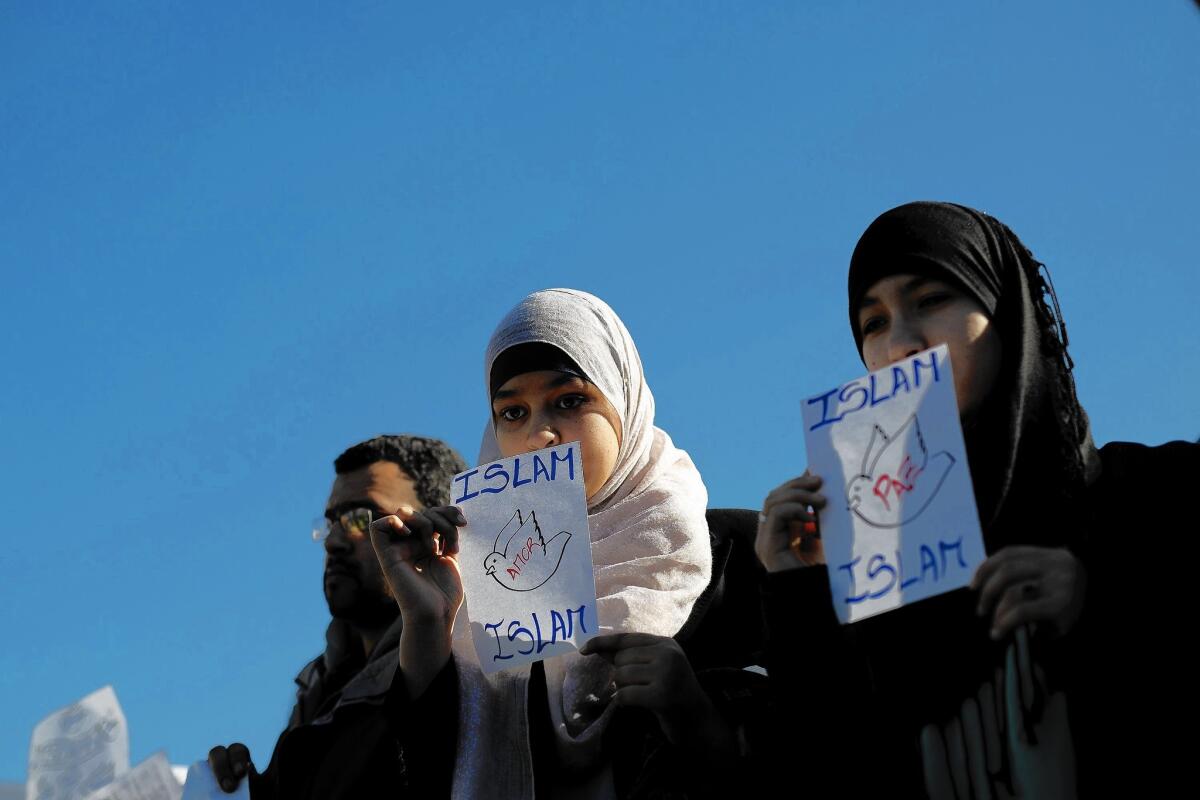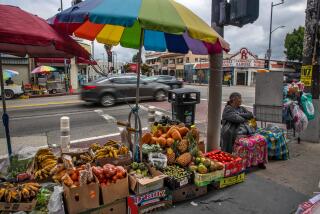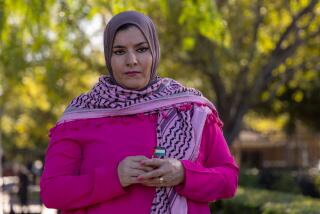In Spain, proposed ‘kebab law’ angers Muslim business owners

Reporting from TARRAGONA, Spain — Nouari Benzawi is trying to figure out how to make his kebab shop more Spanish.
Benzawi, 52, immigrated to Spain from Algeria two decades ago. He’s married to a Spaniard and holds dual nationality. Seven years ago, he and his wife opened the kebab shop and halal grocery store in this breezy, palm tree-lined provincial capital of 135,000 on Spain’s Mediterranean coast.
“My tomatoes are Spanish, and so are the potatoes I sell,” Benzawi said one recent evening, yanking a corrugated metal curtain down over his storefront to close up for the night. “Please explain this to me!” he implored. “Do I need to sell pork to be a ‘traditional Spanish business’? Do I need to sell wine?”
Benzawi, a Muslim, stocks neither pork nor wine. But he worries that those choices could eventually cause him problems if proposed zoning laws take effect this summer. Ruling conservatives, who are seeking reelection in a May 24 municipal vote, hope to limit the number of kebab shops and other traditionally immigrant-owned businesses in Tarragona’s historic quarter.
At a City Council meeting in January, the head of the Tarragona branch of Spain’s ruling Popular Party, Alejandro Fernandez, who is running for mayor, said the changes would prevent immigrant “ghettos” and protect “traditional Spanish businesses.”
No commercial licenses would be granted to any new kebab shops, dollar stores or Internet cafes unless they are situated more than 500 yards from existing ones. The businesses would have to comply with new hygiene standards, Fernandez said, and adhere to stricter opening hours set by City Hall. The laws would not force the closure of any existing businesses.
Still, the proposal had Benzawi frantically stomping around his shop, picking up groceries, reading aloud their “Made in Spain” labels and then slamming them back down on shelves.
“My business is legal!” said Benzawi, who trained as an electrical engineer but could not find work here in his field. He speaks Spanish, French, Arabic and a bit of English. “I pay my taxes. I don’t sell contraband. So what are they so worried about? This is called discrimination.”
A majority of Spain’s estimated 1.6 million Muslims are first-generation immigrants like Benzawi. Most are from just across the Mediterranean Sea — Morocco, Algeria or Tunisia — though a growing number are from Pakistan and Senegal. Although the Spanish government doesn’t track unemployment data by religion, local Muslim leaders say their community has been disproportionately hurt by the country’s economic crisis, with a jobless rate several percentage points higher than the national average, which is stuck at 23% and double that for the youth.
Fernandez, the man behind Tarragona’s so-called kebab law, declined to comment, referring interview requests to fellow party members on the town council in neighboring Reus, a Tarragona suburb.
“Our coastal region has always had the most immigration, and we’ve never had any problems,” said Joaquim Enrech Garola, the Reus town councilor for citizens’ security. “In recent years, more Muslims have arrived. Now, for example, let’s say a bunch of Muslim kids are milling around after school. It’s better if we disperse them, because they could form a ghetto. What we’re doing is in their interest and in ours.”
Although Muslims account for about 3% of Spain’s population, they make up nearly 10% of the people in the coastal Catalan provinces of Tarragona and neighboring Barcelona — the highest proportion in mainland Spain and roughly the same or higher than the averages in France, Germany or Britain.
Unlike those countries, Spain has no national far-right anti-immigrant political movement. But Spanish Muslims worry that as fear of Islamic extremism spreads across Europe, policies such as those proposed in Tarragona may become more popular across Spain. They’re urging a national dialogue on what it means to be Spanish, or Muslim, or both, in this historically Catholic country.
In Reus, burqas were banned last year. Spain’s Supreme Court blocked the measure, but the town responded by taking the word “burqa” out of the law. Enrech said it now applies to all full face coverings.
“It’s not to stop the Muslim burqa or niqab,” he said in an interview at the Reus town hall. “It also applies to people wearing motorcycle helmets while walking down the street. It’s not religious.”
Most Tarragona residents interviewed in the city’s historic quarter said they had not heard of the proposed limits on kebab shops, and many responded with alarm about whether the change might affect their favorite late-night joints. At the Tarragona Islamic Center, worshipers discussed the proposals at length before Friday prayers.
“It’s election season. We’re used to this. They think it’ll win them votes,” the center’s imam, Muhammed Abdul-Rahim Bokadira, said in an interview before leading hundreds in prayer in a poorly lighted space that used to house a municipal market.
Separately, Spain announced in February that it was investigating hundreds of Muslim-owned businesses, including some in Tarragona, on allegations that they funneled money to Islamic State militants in the Middle East. Vendors are accused of doing so through hawala, an informal money transfer system used predominantly by immigrants, for whom Western Union or other bank transfer fees may be too high.
Many of Spain’s Muslims rely on the hawala system to send remittances to support relatives in other countries, said Hilal Tarkou, a lawyer of Moroccan descent who heads the local Watani Islamic Assn. He worries the investigation will cast more suspicion on his already-struggling Muslim community.
“Whenever there’s a crisis,” Tarkou said, “they always blame the weakest ones — the immigrants.”
Frayer is a special correspondent.
ALSO:
Teen held in teacher’s death following crossbow attack in Barcelona
At summit on extremism, Obama defends his semantic choices regarding Islam
Op-Ed: Charlie Hebdo cartoonists: heroes or racists? The answer’s not that simple
More to Read
Sign up for Essential California
The most important California stories and recommendations in your inbox every morning.
You may occasionally receive promotional content from the Los Angeles Times.










